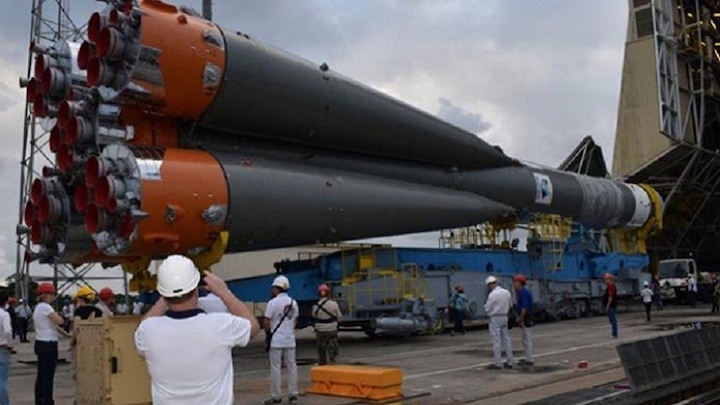22.05.2020

Engineers prepare to send into orbit Rwanda’s first-ever satellite from a spaceport on the Atlantic coast of French Guiana last year. The main purpose of the satellite, nicknamed ‘Icyerekezo’ by students from Nkombo Island, is to connect remote schools to the internet. / Photo: File.
A cabinet meeting held on Monday approved a draft law establishing the Rwanda Space Agency (RSA), signaling yet another step towards promoting advancement in earth observation technologies.
The new space agency is expected to be operational by July, according to the Ministry of ICT and Innovation.
Paula Ingabire, the Minister of ICT and Innovation told The New Times that they were “working towards having the Rwanda Space Agency operational beginning July 2020.”
She highlighted that the “decision to establish RSA is informed by past investment we have made towards utilizing outer space technologies.”
Rwanda has laid ground for space technologies through the establishment of ESRI Rwanda, which provides mapping services and GIS solutions to government agencies, and the Centre of the Geographic Information System at the University of Rwanda.
The minister said the country currently utilizes satellite imagery in conducting the national census, urban planning, land management and academic research.
Ingabire pointed out the need for the country to build international connectivity contingency, leverage geospatial services for agriculture, urban planning, emergency response, and build a knowledge base in space technologies.
“[This] required establishment of a dedicated entity to coordinate such interventions at a national level,” she said.
What role will it play?
The RSA will support prediction and planning in agriculture, environmental monitoring, disaster preparedness, as well as urban planning through the utilization of satellite data and imagery services.
Ingabire told this publication that the new space agency will be responsible for preparing policies and regulations that position Rwanda competitively in the space industry.
It will coordinate and support scientific research and capacity building programmes in space sciences and technology, as well as design, build and launch satellites.
Rwanda Space Agency will similarly manage international space cooperation on behalf of the Government.
This comes a few months after the country launched its first satellite into space, thanks to the partnership between the Government and the Japanese Aerospace and Exploration Agency (JAXA).
Last year, a team of Rwandan engineers trained at the University of Tokyo collaborated with their Japanese counterparts to launch RWASAT-1, a mini satellite, commonly known as CubeSats.
The country was hoping to leverage such satellites to promote precision agriculture, among other things.
From the orbit, RWASAT-1 would be sending information to ground stations, which agriculture institutions could utilise to make informed decisions in the prediction of crop yields as well as soil moisture monitoring.
At least 80 Rwandans have so far been trained in different space related technologies.
Long-term plans
The government announced last year a long-term space programme aimed at growing the country’s uptake of space technologies and boosting research and development of space science.
The plan was announced in a bid to harmonise ongoing government collaborations with foreign partners that are related to space science and technology.
Last year in May, Rwanda applied to join the United Nations Committee on the Peaceful Uses of Outer Space (C0PUOS) at the ongoing 62nd COPUOS session in Vienna, Austria.
“The interest of the Republic of Rwanda in this membership is based on a strong desire to revolutionize and develop its own space sciences and technology facilities, in order to really access and exploit space technology for national benefits,” the application read in part
The Government said that Rwanda views international cooperation and partnership in the global space arena, especially active participation in the COPUOS as paramount to achieve that goal.
The African space economy is now worth $7 billion and is projected to grow at a 7.3 per cent compound annual growth rate to exceed $10 billion by 2024, according to last year’s African Space Industry report.
Quelle: The NewTimes
